
Six Reasons We Have to Carry Our Crosses
Session Three
Read the slides below and then follow the information on the rest of the page.
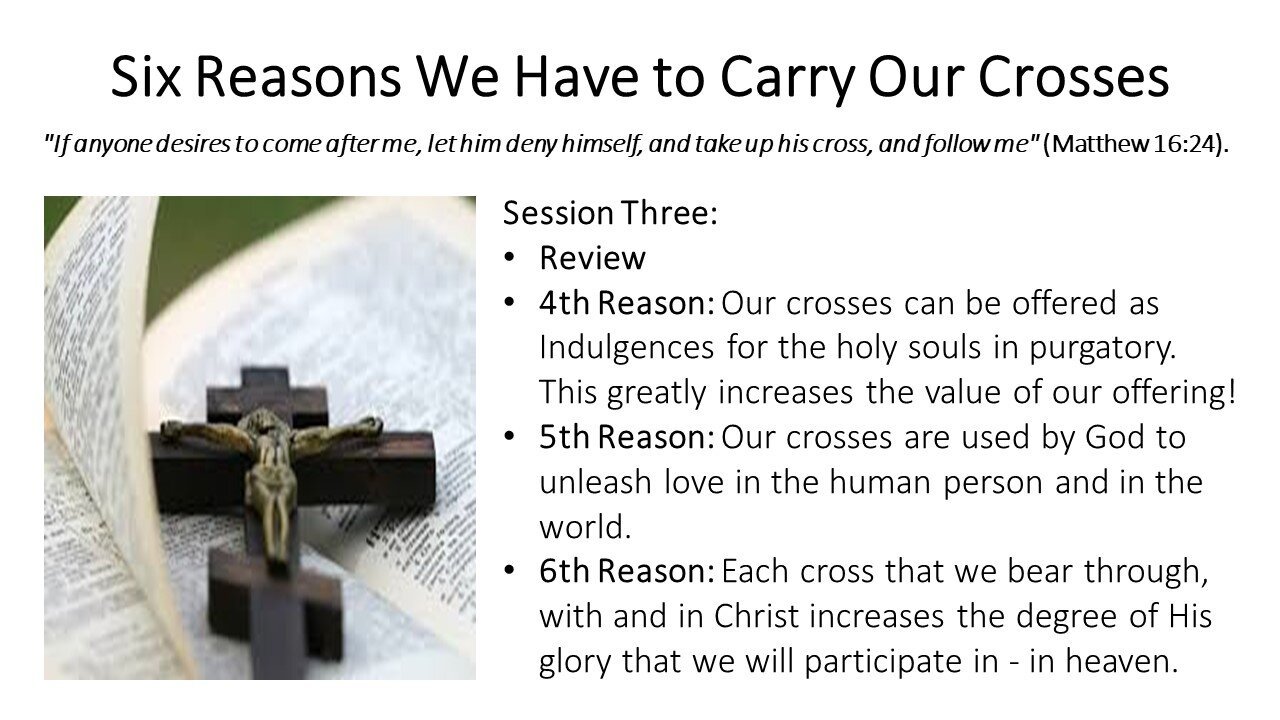






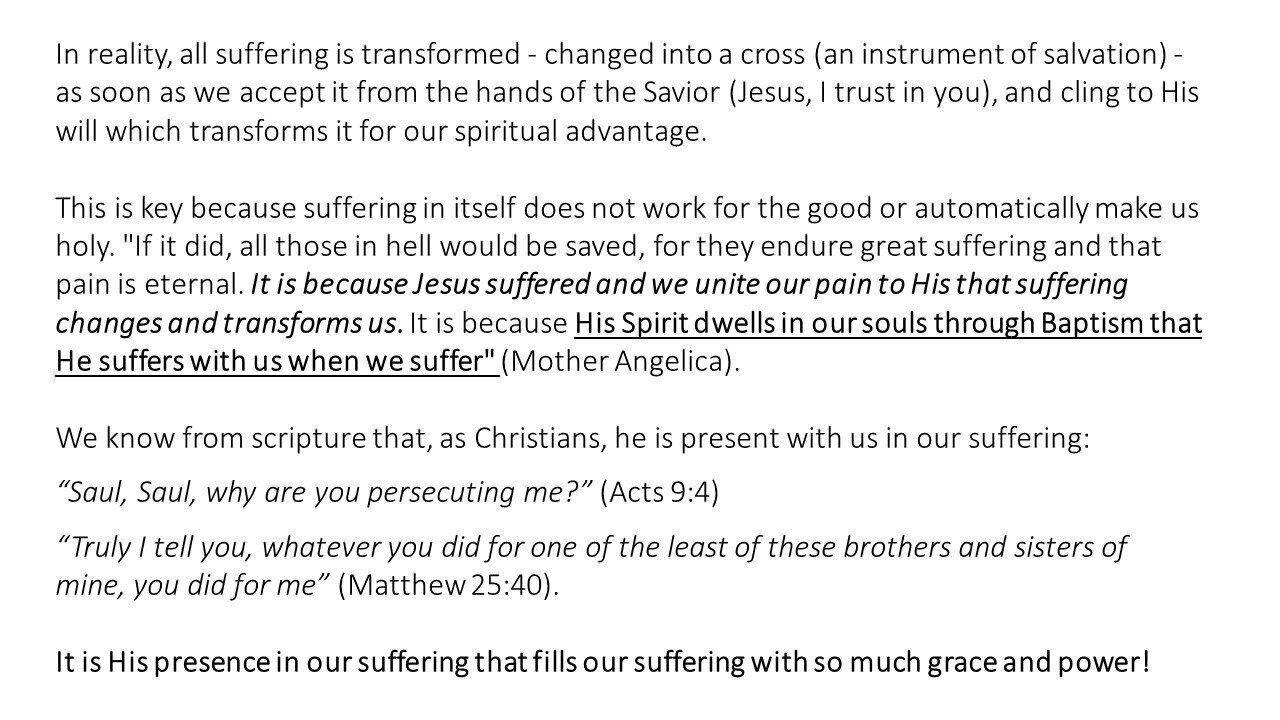

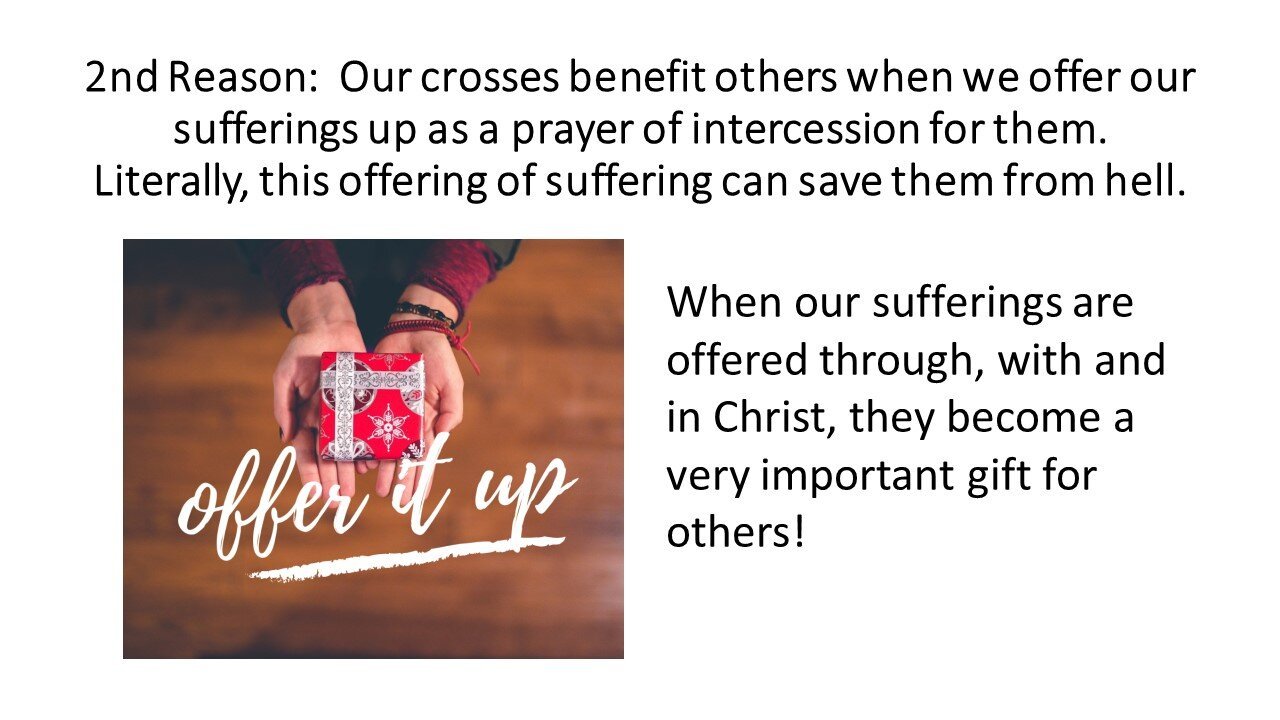

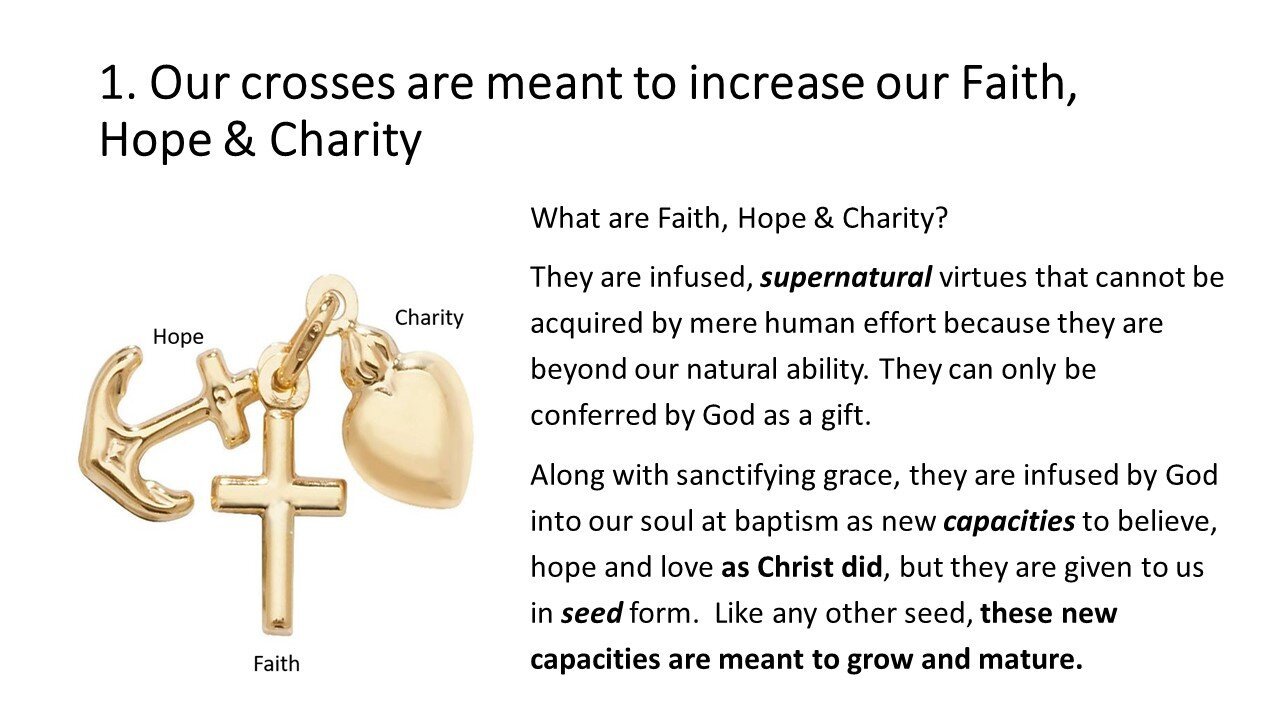
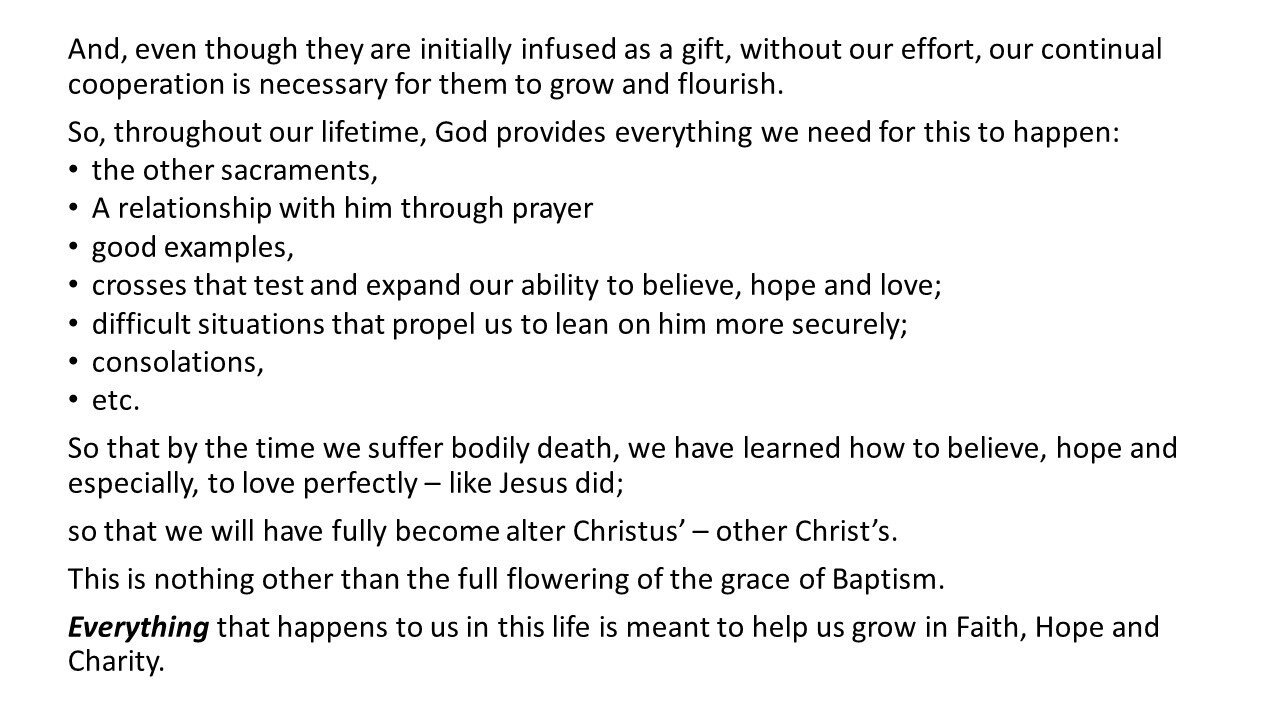
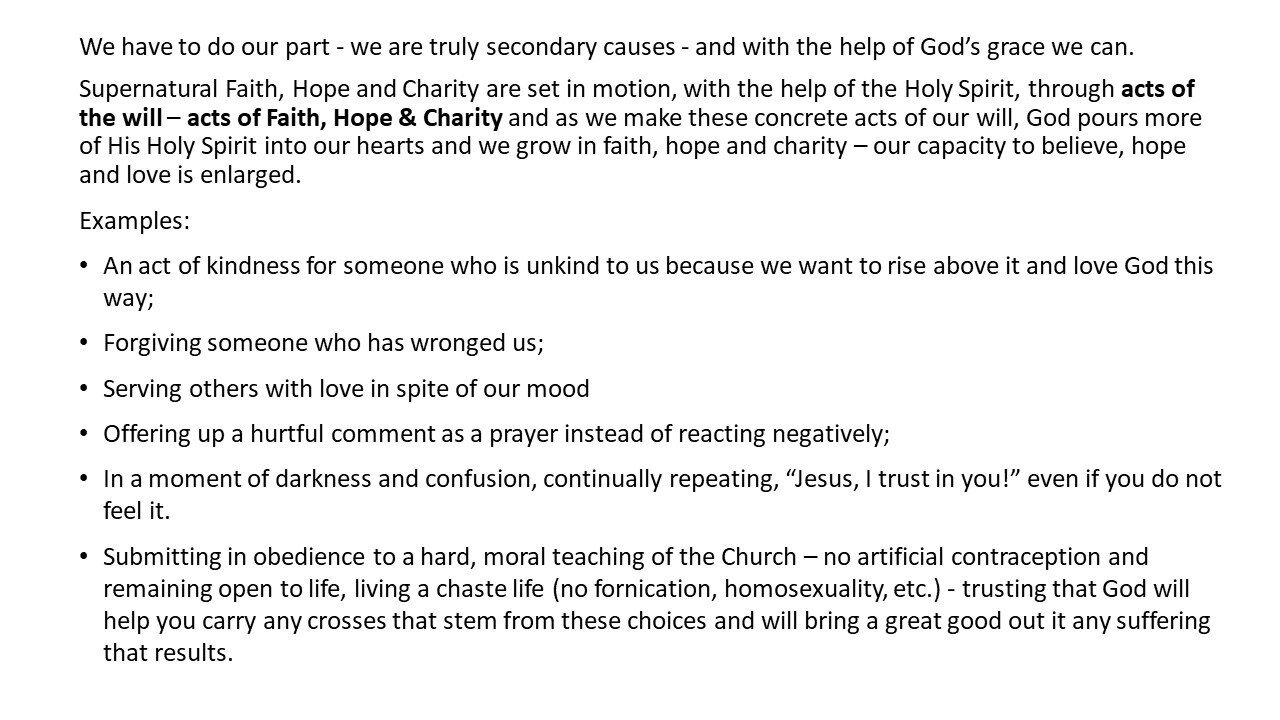


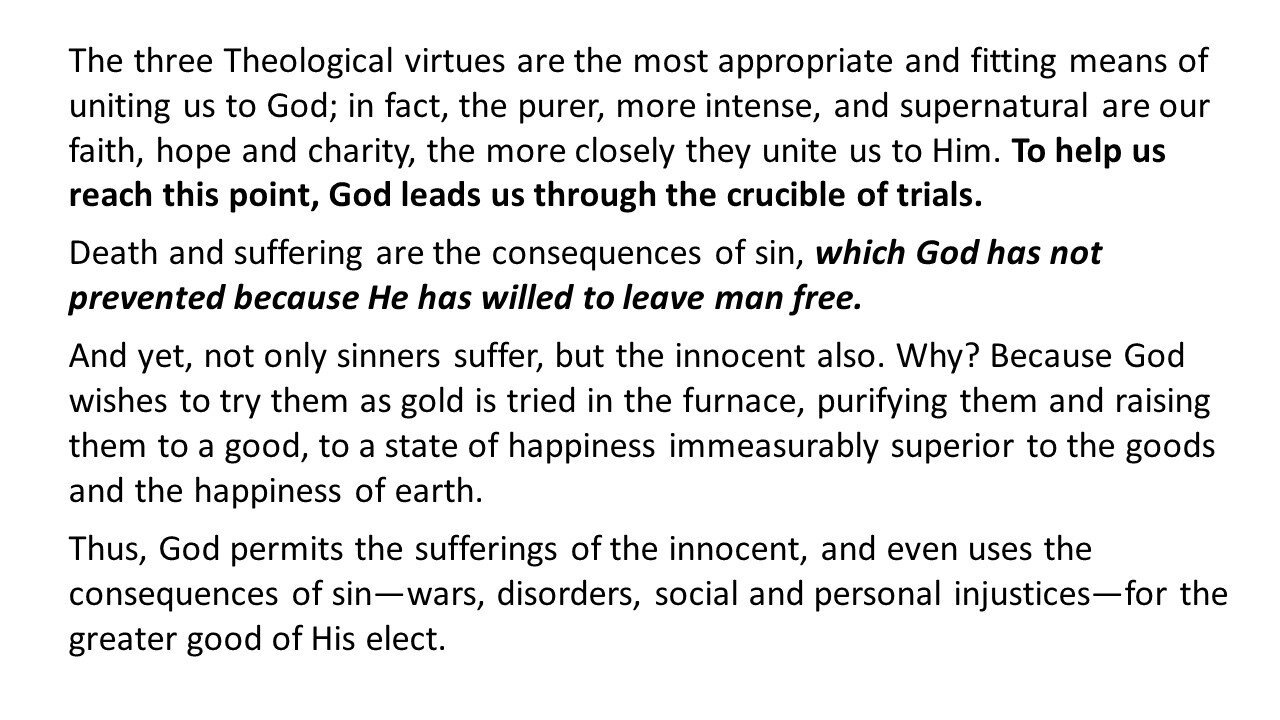
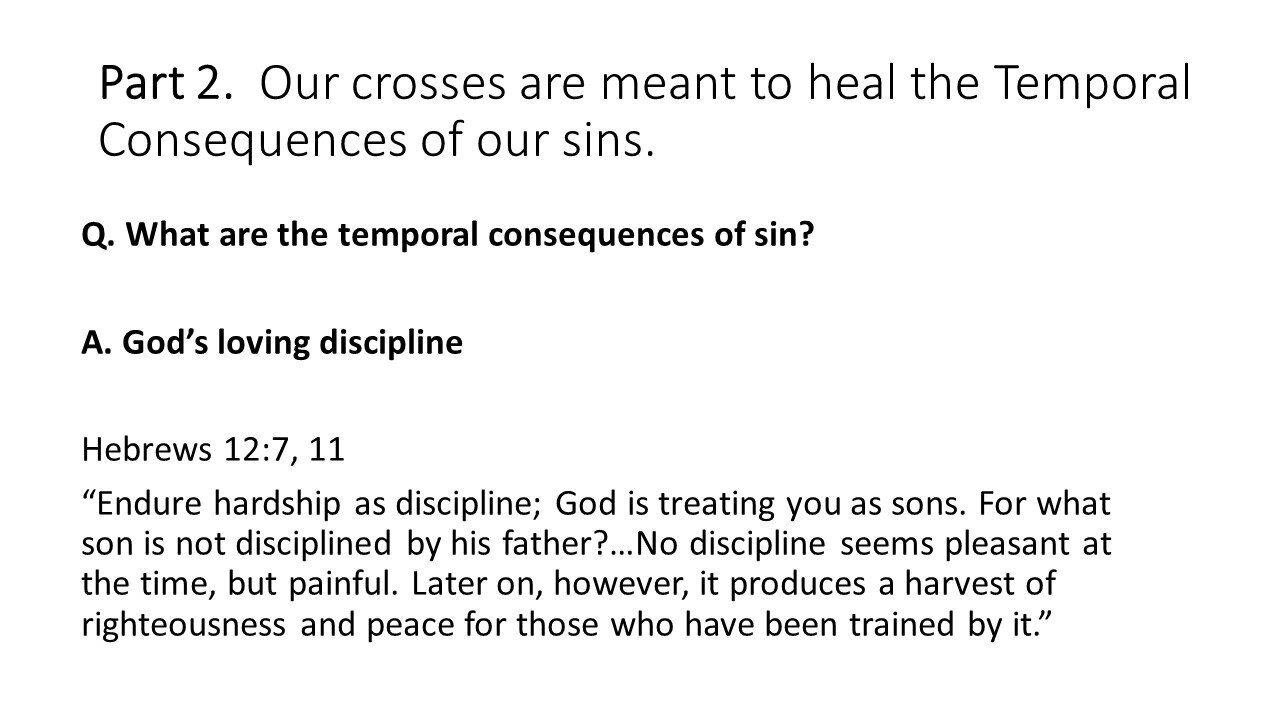






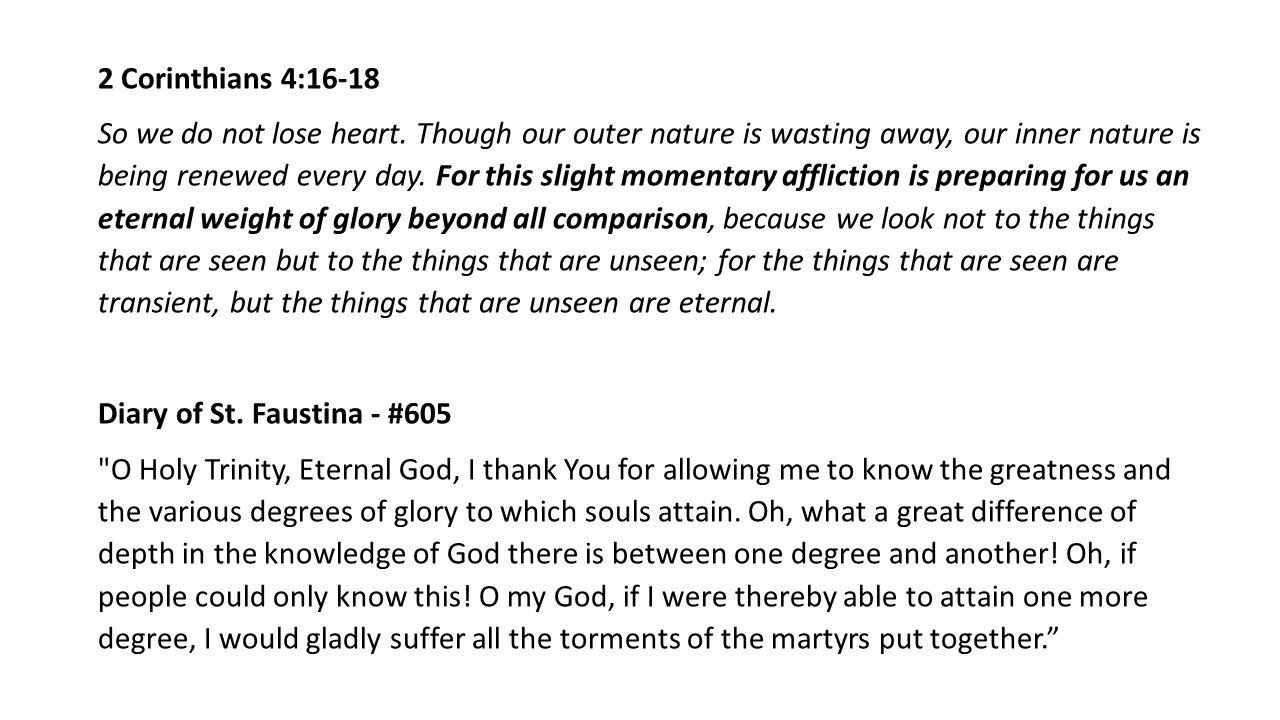

Purgatory and Redemptive Suffering
Jessica Ptomey, Ph. D
4th Reason:
Our crosses can be offered as Indulgences for the holy souls in purgatory. This greatly increases the value of our offering!
Indulgences are a great gift of God’s mercy. They help to satisfy for the temporal punishment due to sins and can be gained for ourselves or for the souls in Purgatory. Indulgences are a wonderful way to effectively help our love ones who have died.
Many of us feel a sense of guilt after the death of someone close to us, wishing that we would have done things differently. Indulgences give us a chance to remedy that by helping them now in their current state. Many (probably most) of our loved ones didn’t have a chance to satisfy for the temporal punishment of their sins before they died; they might not have even realized that they needed to, and, on top of that, the souls in Purgatory cannot help themselves – they are not in a position to merit any longer - so they need our help.
Indulgences offer us a wonderful incentive to make our entire day into a prayer – an offering of love. There are indulgences for specific prayers; for fulfilling our daily duties to the best of our ability and bearing difficulties of life in a Christian spirit. There are indulgences for acts of charity and for acts of penance.
I try to offer every prayer, work, joy, sorrow and suffering; every difficultly―traffic, weather, rudeness from other people, difficult situations at work, headache, etc.―as an indulgence by bearing each one patiently, doing my best and offering each one with love to God.
Press the black button for the teaching on Indulgences:
An Analogy for Indulgences & the Communion of Saints
“In the one family of God, we can all help each other.”
A young boy, in defiance of his father for not letting him play baseball in his yard, plays baseball anyway and ends up throwing a baseball through the window.
He soon realizes that he is in trouble so he apologizes to his father in order to mitigate the punishment. The wise father knows that if all his son has to do is say he is sorry, he wouldn’t have a true change of heart and he might easily do it again or even something worse down the road.
His father does forgive him (the relationship is restored) but he tells him that there is still the problem (temporal consequence) of the broken window that needs to be fixed and that he will need to earn the money to fix it (temporal punishment).
The boy sets out to earn the money and, at first, his heart is still angry, but as he goes about the task, his heart begins to change and he begins to feel truly sorry for what he has done.
At this point his older brother is watching what is going on and he sees the change of heart that his brother is undergoing and that he is truly repentant so, he goes to the father and asks if he can help him pay for the window. The father is so pleased with his concern and generosity and looks forward to the way that this would strengthen the relationship between his two sons, so he agrees to a “matching system” where, for every dollar that the young boy earns, his older brother will match it from his savings. The debt of the broken window is taken care of through the hard work and love between the two sons.
When we are truly repentant for our sins (which is one of the conditions for gaining an indulgence), God allows the saints to come to our aid through indulgences. He matches the merit of our actions by drawing from the treasury of the Church. In this way, we learn that there are consequences for our actions but at the same time, we are not alone in our efforts to make amends. It is truly an amazing gift to be a member of the Mystical Body of Christ – the Church!
5th Reason:
Our crosses are used by God to unleash love in the human person and in the world.
Our crosses are used by God to release a purer and stronger love into the world; a love is released that was not present and active before the suffering began. "Suffering is present in this life in order to unleash love in the human person and in the world" (Pope St. John Paul II).
Think of the amount of active sacrificial love, compassion and concern that is released when a natural disaster occurs. How many people stop pursuing their selfish pursuits and focus on helping the people in need in that moment?
That is just one example of this. If we make it to heaven, we will see from God's perspective how much love was unleashed and grew because of our sufferings and we will bow our head and say, Amen! We will be eternally grateful that we were able to help others grow in sacrificial love and for the effect that our suffering had on the world.
NEVER FORGET: THIS LIFE IS NOT PARADISE. IT IS A PREPARATION FOR PARADISE!
6th Reason:
Each cross that we bear through, with and in Christ increases the degree of His glory that we will participate in - in heaven.
Finally, not only does handling our crosses this way bear fruit for others, this sacrifice and suffering that we bear in, with and through Christ, is preparing for us an eternal weight of glory - it is increasing our capacity to love and our growth in virtue – making us more like Christ. This increases the degree of His glory that we will participate in - in heaven. Every cross that we bear patiently and offer as an intercessory prayer for others, increases our glory from one degree to another:
Romans 8:16-18
“For the Spirit Himself gives testimony to our spirit that we are the sons of God. And if sons, heirs also; heirs indeed of God and joint heirs with Christ: yet so, if we suffer with Him, that we may be also glorified with Him. The sufferings of this time are not worthy to be compared with the glory to come that shall be revealed in us.”
2 Corinthians 4:16-18
So we do not lose heart. Though our outer nature is wasting away, our inner nature is being renewed every day. For this slight momentary affliction is preparing for us an eternal weight of glory beyond all comparison, because we look not to the things that are seen but to the things that are unseen; for the things that are seen are transient, but the things that are unseen are eternal.
Diary of St. Faustina - #605
"O Holy Trinity, Eternal God, I thank You for allowing me to know the greatness and the various degrees of glory to which souls attain. Oh, what a great difference of depth in the knowledge of God there is between one degree and another! Oh, if people could only know this! O my God, if I were thereby able to attain one more degree, I would gladly suffer all the torments of the martyrs put together.”
Press the black button below to gain a greater understanding of What the Church Teaches about Heaven:
Holy Acceptance of Death as a Means of Avoiding Purgatory and Advancing in the Degree of Glory We Will Enjoy in Heaven
In this class we learned that suffering is meant to increase our Faith, Hope and Love. We learned that Faith is the theological virtue that enables us to see things from God's perspective. One of the effects of this is that our vision of earthly realities like suffering is elevated and greatly enriched. For example, when a person is dying and we see that they are suffering greatly, we may feel anxious and wish that his or her suffering would end as soon as possible and we might even be tempted to consent to giving him/her pain medication that would put him/her into a coma like state. This is because our view of suffering is only at a natural level and needs to be elevated to a supernatural level by the gift of Faith. It would be a mistake to give into this temptation. Yes, we should try to relieve their pain as much as possible but not to the point where he/she loses consciousness. Instead, this is a time to help them to submit to God's will in order to be purified of sin and to gain great merit for eternal life.
In fact the Church teaches us the following very important truth: The humble and submissive acceptance of death in expiation of our sins is a generous act, by which we make a sacrifice of our life to God, in union with the sacrifice of Jesus Christ upon the cross.
Catechism of the Catholic Church:
1473 The forgiveness of sin and restoration of communion with God entail the remission of the eternal punishment of sin, but temporal punishment of sin remains. While patiently bearing sufferings and trials of all kinds and, when the day comes, serenely facing death, the Christian must strive to accept this temporal punishment of sin as a grace. He should strive by works of mercy and charity, as well as by prayer and the various practices of penance, to put off completely the "old man" and to put on the "new man"(Eph 4:22,24).
Here is a true story that shows how important this is:
Sister Mary of St. Joseph, one of the first four Carmelites to embrace the reform of St. Teresa, was a Religious of great virtue. The end of her career approached, and Our Lord, wishing that His spouse should be received into Heaven in triumph on breathing her last sigh, purified and adorned her soul by the sufferings which marked the end of her life.
During the four last days which she passed upon earth, she lost her speech and the use of her senses; she was a prey to frightful agony, and the Religious were heartbroken to see her in that state. Mother Isabella of St. Dominic, Prioress of the convent, approached the sick Religious, and suggested to her to make many acts of resignation, and total abandonment of herself into the hands of God. Sister Mary of Joseph heard her, and made these acts interiorly, but without being able to give any exterior sign thereof.
She died in these holy dispositions, and, on the very day of her death, whilst Mother Isabella was hearing Mass and praying for the repose of her soul, Our Lord showed her the soul of His faithful spouse crowned in glory, and said, “She is of the number of those who follow the Lamb.” Sister Mary of St. Joseph, on her part, thanked Mother Isabella for all the good she had procured for her at the hour of death. She added that the acts of resignation which she had suggested to her had merited for her great glory in Paradise and had exempted her from the pains of Purgatory (Life of Mother Isabella, lib. 3, c. 7).
What happiness to quit this miserable life, to enter the only true and blessed one! We all may enjoy this happiness, if we employ the means which Jesus Christ has given us for making satisfaction in this world, and for preparing our souls perfectly to appear in His presence.
Press the black button below to read a meditation on the Virtue of Hope:
Press the black button below to read a meditation on our Father’s Loving Care for Us - even in suffering:
Saint Pio
Suffering & Love


